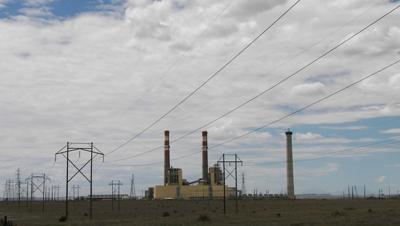A share of $18 million in federal funds from the U.S. Department of Energy has been awarded to northwest Colorado for technical assistance to “to create tailored community-wide action plans that reduce local air pollution, increase energy resilience, lower utility costs and energy burdens, and create good paying jobs.”
Colorado is one of 30 applicants nationwide selected for the Communities Local Energy Action Program. It is “a unique technical assistance initiative designed to help disadvantaged communities and those with historical ties to fossil fuel industries take direct control of their clean energy future,” according to a news release from the DOE.
The money allocated to Colorado will be used by communities to work with technical assistance providers, local governments, community organizations, utilities, and economic development organizations to develop clean energy plans that will foster economic development in places like Craig and Hayden — where coal mining for power generation has supported the communities for more than 160 years.
This federal program will add to the state’s attempt to economically transition rural areas away from dependency on coal mining and coal-fired powerplants, which currently provides nearly 1,000 jobs, and more than $19 million annually in property taxes in Moffat County and Craig, according to the Colorado Department of Labor and Employment.
“Under the Biden-Harris Administration, communities that have been overburdened and underserved for far too long can now leverage the federal tools needed to bring their clean energy future to life,” said U.S. Secretary of Energy Jennifer M. Granholm in a release.
Some of the areas of consideration mentioned by the DOE in its release include:
- Clean energy planning and development
- Energy efficient buildings and beneficial electrification planning and investment
- Clean Transportation Planning and Investment
- Carbon capture and storage
- Critical minerals resource potential from energy wastes and by-products
- Community resilience microgrids
- New, or enhanced, manufacturing
- Advanced nuclear technology and support for existing reactors
Colorado's regulatory transition away from coal-and-gas-fired energy has been rapidly accelerating. In 2004, Colorado became the first state in the country to require, via the ballot box, a renewable energy portfolio standard for power producers.
Since then, the Colorado General Assembly has enacted dozens of laws mandating a transition away from fossil fuel energy sources that will close all of Colorado’s coal-fired powerplants by 2031, according to the state labor department.
The push for 100% clean power by 2040 announced by Gov. Jared Polis in his Greenhouse Gas Reduction Roadmap also spawned numerous new state agencies, offices, and enterprises to direct and manage all of the legislative mandates.
Critics allege the transition is coming at the expense of rural jobs and regional economic vitality. That's a reality the state's policymakers, including the governor, sought to ease by establishing a plan to help financially devastated communities by creating a Just Transition Action Plan, and a state bureaucracy to run it.
The Colorado Office of Just Transition was created to spearhead efforts. Funded to the tune of $15 million in one-time stimulus funds, Colorado Department of Labor and Employment officials admit they no idea where it will come up with the more than $100 million the department estimates may be needed to successfully transition rural communities.
The town of Hayden, for example, depends on revenue from the fossil fuel industry for survival: 55% of a voter-approved $22.3 million school bond is dependent on revenue produced by the Hayden coal-fired power plant, due to be closed by Xcel Energy by 2028. Hayden’s fire district, library district, hospital district and cemetery district get between 55% and 60% of their funding from the Hayden power plant.
“Coal communities have powered the state of Colorado for generations,” said Routt County Commissioner Beth Melton in a news release. “As we transition to other sources of energy, we have a moral obligation to ensure that coal workers and communities are not left behind.”
Colorado Sen. Dennis Hisey, R-Colorado Springs, said in a previous interview with The Denver Gazette: “You're just not going to retrain coal miners and people in other good-paying jobs to work in the tourism industry. It's going to be a shift at the municipal level where the small towns reinvent who they are and there will be people moving out, and hopefully new people moving back in.”
Attempts to reach Polis's office and the Colorado Energy Office by press time were unsuccessful.
Learn more about the Communities LEAP project at the Department of Energy.


(0) comments
Welcome to the discussion.
Log In
Post a comment as Guest
Keep it Clean. Please avoid obscene, vulgar, lewd, racist or sexually-oriented language.
PLEASE TURN OFF YOUR CAPS LOCK.
Don't Threaten. Threats of harming another person will not be tolerated.
Be Truthful. Don't knowingly lie about anyone or anything.
Be Nice. No racism, sexism or any sort of -ism that is degrading to another person.
Be Proactive. Use the 'Report' link on each comment to let us know of abusive posts.
Share with Us. We'd love to hear eyewitness accounts, the history behind an article.